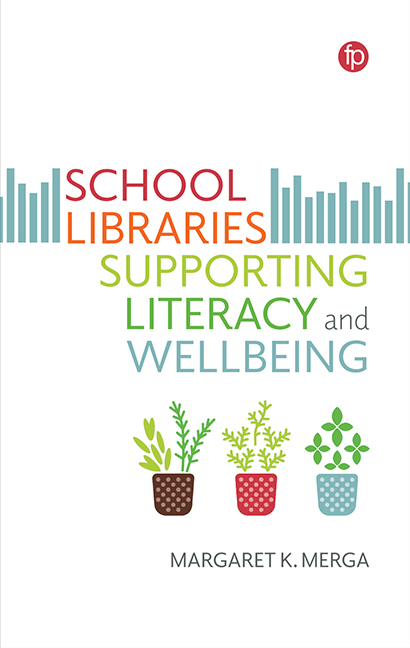Book contents
- Frontmatter
- Contents
- List of Tables
- Acknowledgements
- Abbreviations
- Introduction
- 1 What Do School Library Professionals Contribute to Student Learning and Support? A Focus on Australia and the UK
- 2 School Libraries and Reading Engagement for Literacy
- 3 Librarians Supporting Struggling Literacy Learners Beyond the Early Years
- 4 School Libraries and Reading Engagement for Student Wellbeing
- 5 School Libraries, Health Resourcing and Information Literacy
- 6 Librarians Creating Environments for Reading and Wellbeing
- 7 Challenges to Visibility and Advocacy for School Libraries and Staff
- Conclusions and Directions for Future Research
- Appendix 1 Background and Methods of My Research Projects
- Appendix 2 A Place to Get Away from It All: Five Ways School Libraries Support Student Wellbeing
- Index
4 - School Libraries and Reading Engagement for Student Wellbeing
Published online by Cambridge University Press: 21 April 2022
- Frontmatter
- Contents
- List of Tables
- Acknowledgements
- Abbreviations
- Introduction
- 1 What Do School Library Professionals Contribute to Student Learning and Support? A Focus on Australia and the UK
- 2 School Libraries and Reading Engagement for Literacy
- 3 Librarians Supporting Struggling Literacy Learners Beyond the Early Years
- 4 School Libraries and Reading Engagement for Student Wellbeing
- 5 School Libraries, Health Resourcing and Information Literacy
- 6 Librarians Creating Environments for Reading and Wellbeing
- 7 Challenges to Visibility and Advocacy for School Libraries and Staff
- Conclusions and Directions for Future Research
- Appendix 1 Background and Methods of My Research Projects
- Appendix 2 A Place to Get Away from It All: Five Ways School Libraries Support Student Wellbeing
- Index
Summary
How does the library enable reading for pleasure (RfP), and how does this relate to student wellbeing? It's time to start tying together the two key concerns of this book: wellbeing and literacy as facilitated through reading engagement.
In the Introduction to this book, I defined wellbeing as relating to more than just a lack of physical or mental illness, but rather a broader construct that includes diverse ‘physical, social, emotional, intellectual, spiritual, and environmental aspects’ (Bladek, 2021, p. 3). I have also demonstrated that reading engagement and student wellbeing have some interesting intersections, which I further explore in this chapter, with attention on how school libraries play a role in fostering wellbeing through reading engagement.
RfP can be associated with a positive emotional response in young people (e.g. Kartal & Bilhan, 2021). It is associated with reduced psychological distress in college students (Levine et al., 2020), and mental wellbeing in children (Clark & Teravainen-Goff, 2018). As I’ve briefly covered previously in this book, the regular reading of fiction is also associated with the development of prosocial characteristics (e.g. Mar et al., 2009), which readers can draw upon to facilitate smooth social interactions. Furthermore, recent research has experimented with reading-based interventions to support children who have experienced trauma, finding positive, short-term effects on emotion recognition, though further research is needed (Michalek et al., 2021). Recent research also suggests that reading can provide respite from the stressors of pandemic conditions, ‘supporting children's mental wellbeing and enabling them to dream about the future’, with 59.3% of young respondents affirming during lockdown ‘that reading makes them feel better’ (Clark & Picton, 2020, p. 2). As such, RfP can play an important role in meeting the social and emotional needs of young people, building a sense of optimism and hope in troubling times.
My own previous research has explored how reading can be used by avid readers to support mental health, noting that for some readers, ‘the escape of reading was often used in order to regulate emotion’ (Merga, 2017a, p. 152). Furthermore, more than one in five of the 1,022 adult respondents in this study used the word ‘escape’ when describing their reasons for reading books, suggesting that reading for this purpose may be common (Merga, 2017a).
- Type
- Chapter
- Information
- School Libraries Supporting Literacy and Wellbeing , pp. 83 - 100Publisher: FacetPrint publication year: 2022



